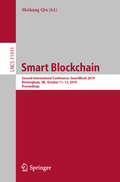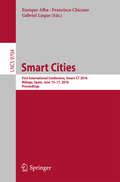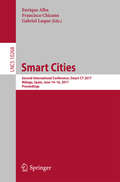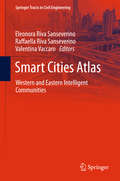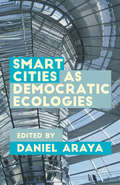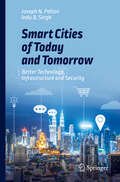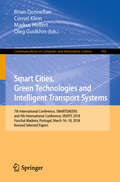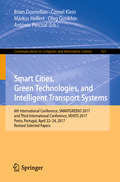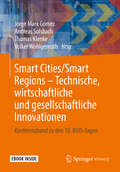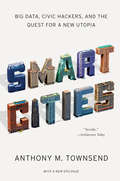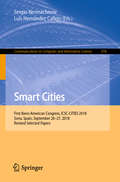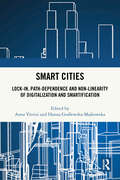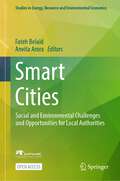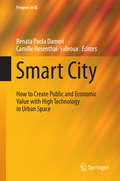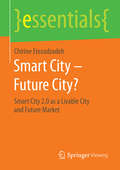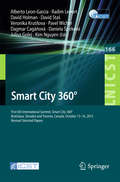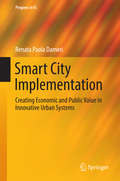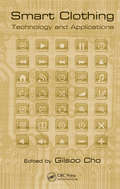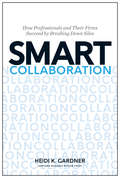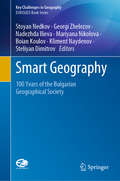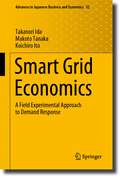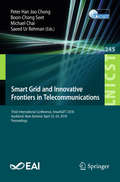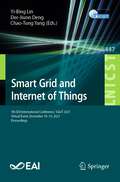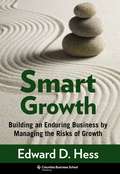- Table View
- List View
Smart Blockchain: Second International Conference, SmartBlock 2019, Birmingham, UK, October 11–13, 2019, Proceedings (Lecture Notes in Computer Science #11911)
by Meikang QiuThis book constitutes the refereed proceedings of the Second International Conference on Smart Blockchain, SmartBlock 2019, held in Birmingham, UK, in October 2019.The 13 papers presented in this volume were carefully reviewed and selected from 100 submissions. They focus on a broad range of topics in the area of blockchain, from privacy-preserving solutions to designing advanced blockchain mechanism, from empirical studies to practical manuals.
Smart Cities
by Enrique Alba Francisco Chicano Gabriel LuqueThis book constitutes the proceedings of the First International Conference on Smart Cities, Smart-CT 2016, held in Malaga, Spain, in June 2016. The 16 papers presented in this volume were carefully reviewed and selected from 28 submissions. They topics covered include studies and tools to improve road traffic, energy consumption, logistics, frameworks to provide new services and take decisions in a holistic way, driving assistance, electric vehicles, public transport, and surveys on smart city concepts.
Smart Cities
by Enrique Alba Francisco Chicano Gabriel LuqueThis book constitutes the proceedings of the First International Conference on Smart Cities, Smart-CT 2016, held in Malaga, Spain, in June 2016. The 16 papers presented in this volume were carefully reviewed and selected from 28 submissions. They topics covered include studies and tools to improve road traffic, energy consumption, logistics, frameworks to provide new services and take decisions in a holistic way, driving assistance, electric vehicles, public transport, and surveys on smart city concepts.
Smart Cities Atlas
by Eleonora Riva Sanseverino Raffaella Riva Sanseverino Valentina VaccaroThe book discusses the concept of the smart city, and is based on a multi-service and multi-sectoral approach to urban planning, including various urban functions and the human capital of cities. The work is divided into three parts. The first is an introductory section which covers definitions, policies and tools used at European level for the development and classification of a smart city. The second presents a selection of examples of Western and Eastern communities, which experienced technologies and strategies that have made them smart. The third describes in detail the main three possible approaches (economical, technological and social) to the smart city concept which are the focus ambits of the holistic concept of smart city. The work provides a good overview of the concept of the smart city, and also offers a critical analysis of the various approaches to smart cities, in order to provide tools to develop solutions that address the smart development of cities with an approach as multi-sectoral as possible. Its accessible language and several examples make the book easy to read and appealing to public administrators, students, planners and researchers.
Smart Cities as Democratic Ecologies
by Daniel ArayaThe concept of the 'smart city' as the confluence of urban planning and technological innovation has become a predominant feature of public policy discourse. Despite its expanding influence, however, there is little consensus on the precise meaning of a 'smart city'. One reason for this ambiguity is that the term means different things to different disciplines. For some, the concept of the 'smart city' refers to advances in sustainability and green technologies. For others, it refers to the deployment of information and communication technologies as next generation infrastructure. This volume focuses on a third strand in this discourse, specifically technology driven changes in democracy and civic engagement. In conjunction with issues related to power grids, transportation networks and urban sustainability, there is a growing need to examine the potential of 'smart cities' as 'democratic ecologies' for citizen empowerment and user-driven innovation. What is the potential of 'smart cities' to become platforms for bottom-up civic engagement in the context of next generation communication, data sharing, and application development? What are the consequences of layering public spaces with computationally mediated technologies? Foucault's notion of the panopticon, a metaphor for a surveillance society, suggests that smart technologies deployed in the design of 'smart cities' should be evaluated in terms of the ways in which they enable, or curtail, new urban literacies and emergent social practices.
Smart Cities of Today and Tomorrow: Better Technology, Infrastructure and Security
by Joseph N. Pelton Indu B. SinghHackers, cyber-criminals, Dark Web users, and techno-terrorists beware! This book should make you think twice about attempting to do your dirty work in the smart cities of tomorrow.Scores of cities around the world have begun planning what are known as “smart cities.” These new or revamped urban areas use the latest technology to make the lives of residents easier and more enjoyable.They will have automated infrastructures such as the Internet of Things, “the Cloud,” automated industrial controls, electronic money, mobile and communication satellite systems, wireless texting and networking. With all of these benefits come new forms of danger, and so these cities will need many safeguards to prevent cyber criminals from wreaking havoc. This book explains the advantages of smart cities and how to design and operate one. Based on the practical experience of the authors in projects in the U.S. and overseas in Dubai, Malaysia, Brazil and India, it tells how such a city is planned and analyzes vital security concerns that must be addressed along the way.Most of us will eventually live in smart cities. What are the advantages and the latest design strategies for such ventures? What are the potential drawbacks? How will they change the lives of everyday citizens? This book offers a preview of our future and how you can help prepare yourself for the changes to come.
Smart Cities, Green Technologies and Intelligent Transport Systems: 7th International Conference, SMARTGREENS, and 4th International Conference, VEHITS 2018, Funchal-Madeira, Portugal, March 16-18, 2018, Revised Selected Papers (Communications in Computer and Information Science #992)
by Markus Helfert Brian Donnellan Cornel Klein Oleg GusikhinThis book constitutes the thoroughly refereed post-conference proceedings of the 7th International Conference on Smart Cities and Green ICT Systems, SMARTGREENS 2018, and the 4th International Conference on Vehicle Technology and Intelligent Transport Systems, VEHITS 2018, held in Funchal-Madeira, Portugal in March 2018.The 18 full papers presented during SMARTGREENS 2018 and VEHITS 2018 were carefully reviewed and selected from numerous submissions. The papers reflect topics such as smart cities and green ICT systems; vehicle technology and intelligent transport systems.
Smart Cities, Green Technologies, and Intelligent Transport Systems: 6th International Conference, SMARTGREENS 2017, and Third International Conference, VEHITS 2017, Porto, Portugal, April 22-24, 2017, Revised Selected Papers (Communications in Computer and Information Science #921)
by Markus Helfert Brian Donnellan Cornel Klein Oleg Gusikhin António PascoalThis book constitutes the thoroughly refereed post-conference proceedings of the 5th International Conference on Smart Cities and Green ICT Systems, SMARTGREENS 2017, and the Third International Conference on Vehicle Technology and Intelligent Transport Systems, VEHITS 2017, held in Porto, Portugal in April 2017.The 8 full papers of SMARTGREENS 2017 presented were carefully reviewed and selected from 70 submissions. VEHITS 2017 received 77 paper submissions from which 9 papers were selected and published in this book. The papers reflect topics such as smart cities, energy-aware systems and technologies, sustainable computing and communications, sustainable transportation and smart mobility.
Smart Cities/Smart Regions – Technische, wirtschaftliche und gesellschaftliche Innovationen: Konferenzband zu den 10. BUIS-Tagen
by Jorge Marx Gómez Volker Wohlgemuth Andreas Solsbach Thomas KlenkeIn diesem Tagungsband zu den 10. BUIS-Tagen (20. Tagung der Fachgruppe Betriebliche Umweltinformationssysteme der Gesellschaft für Informatik e. V.) werden Thematiken „smarter“ Städte und Regionen unter Einsatz von nachhaltigen IKT-Lösungen in Beiträgen aus Wissenschaft und Praxis vorgestellt. Betriebliche Umweltinformationssysteme erfassen, analysieren und stellen hierbei umweltrelevante Daten für vielschichtige Prozesse bereit. Das Spektrum der Fachbeiträge zeigt die Vielfalt der Fragestellungen und den Einsatz von IKT-Lösungen in der Förderung der Ziele für eine nachhaltige Entwicklung auf. Wesentlichen Raum nehmen Beiträge zur Wissenschaftskooperation und zum Erfahrungstransfer zwischen afrikanischen und europäischen Wissenschaftlerinnen und Wissenschaftlern auf allen Themenfeldern der Tagung ein.
Smart Cities: Big Data, Civic Hackers, and the Quest for a New Utopia
by Anthony M. TownsendAn unflinching look at the aspiring city-builders of our smart, mobile, connected future. We live in a world defined by urbanization and digital ubiquity, where mobile broadband connections outnumber fixed ones, machines dominate a new "internet of things," and more people live in cities than in the countryside. In Smart Cities, urbanist and technology expert Anthony Townsend takes a broad historical look at the forces that have shaped the planning and design of cities and information technologies from the rise of the great industrial cities of the nineteenth century to the present. A century ago, the telegraph and the mechanical tabulator were used to tame cities of millions. Today, cellular networks and cloud computing tie together the complex choreography of mega-regions of tens of millions of people. In response, cities worldwide are deploying technology to address both the timeless challenges of government and the mounting problems posed by human settlements of previously unimaginable size and complexity. In Chicago, GPS sensors on snow plows feed a real-time "plow tracker" map that everyone can access. In Zaragoza, Spain, a "citizen card" can get you on the free city-wide Wi-Fi network, unlock a bike share, check a book out of the library, and pay for your bus ride home. In New York, a guerrilla group of citizen-scientists installed sensors in local sewers to alert you when stormwater runoff overwhelms the system, dumping waste into local waterways. As technology barons, entrepreneurs, mayors, and an emerging vanguard of civic hackers are trying to shape this new frontier, Smart Cities considers the motivations, aspirations, and shortcomings of them all while offering a new civics to guide our efforts as we build the future together, one click at a time.
Smart Cities: First Ibero-American Congress, ICSC-CITIES 2018, Soria, Spain, September 26–27, 2018, Revised Selected Papers (Communications in Computer and Information Science #978)
by Sergio Nesmachnow Luis Hernández CallejoThis book constitutes the thoroughly refereed proceedings of the First Ibero-American Congress, ICSC-CITIES 2018, held in Soria, Spain, in May 2018. The 15 full papers presented were carefully reviewed and selected from 101 submissions. The papers cover wide research fields including smart cities, energy efficiency and sustainability, infrastructures, smart mobility, intelligent transportation systems, Internet of Things, governance and citizenship.
Smart Cities: Lock-in, Path-dependence and Non-linearity of Digitalization and Smartification (Advances In Science, Technology And Innovation Ser.)
by Anna Visvizi Hanna Godlewska-MajkowskaThis book seeks to identify and to examine factors and mechanisms underlying the growth and development of smart cities.It is commonplace to discuss smart cities through the lens of advances in ICT. The resulting overemphasis on what is technologically possible downplays what is politically, socially and economically feasible. This book, by analysing the smart city through a variety of perspectives, offers a more comprehensive insight into and understanding of the complex and the open-ended nature of the growth and development of a smart city. A solid conceptual framework is developed and employed throughout the chapters, and a selection of case studies from Europe, Asia, and the Arab Peninsula grants the readers a hands-on perspective of the matters discussed.The chapters included in this book address a set of questions, including: How do the twin-processes of digitalization and smartification unfold in the context of the smart city agenda? How do these processes relate to the concepts of smart city 1.0, 2.0., 3.0. and 4.0? In which ways have the spatial aspects of city functioning been influenced by the intrusion of ICT? In which ways do the same processes contribute to the attainment of the UN Sustainable Development Goals (SDGs)? What are the implications of smartification and the emergence of smart organizations (public, private, and voluntary) for the spatial development of smart cities? Do ICT and its application in the city space boost the processes of revitalization and how does ICT influence the process of gentrification? To what extent and how does the intrusion of ICT-enhanced tools and applications in the city space impact on a city’s relationship with its broader territorially defined context? Are the administrative borders and divisions inherent in the fabric of a city becoming less/more porous? How should urban sprawl be conceived in the context of the smart city debate? This book will have a broad appeal to academics, students, and policy makers with interests in urban planning, sustainable development, cities, economics, technology, sociology, urban studies, digitalization, SDGs, wellbeing, and resilience.
Smart Cities: Social and Environmental Challenges and Opportunities for Local Authorities (Studies in Energy, Resource and Environmental Economics)
by Fateh Belaïd Anvita AroraThis edited volume discusses the socioeconomic, environmental, and policy implications of smart cities. Written by international experts in energy economics and policy, the chapters present wide range of high quality theoretical and empirical studies at the nexus of social, entrepreneurial, governmental and ecological transformation. The book covers a wide range of topics, with a view towards providing empirical evidence of the benefits of smart cities as well as practical frameworks for smart city initiatives. Topics discussed include: smart city transition pillars, innovation for smart and sustainable cities design and implementation, smart city governance, smart mobility within cities, and smart cities in emerging economies. This volume will be of use to students and researchers interested in resource economics, energy economics, sustainability, ICT, and governance, as well as policymakers working on smart city initiatives.This is an open access book.
Smart Citizens, Smarter State: The Technologies of Expertise and the Future of Governing
by Beth Simone NoveckGovernments make too little use of the skills and experience of citizens. New tools--what Beth Simone Noveck calls technologies of expertise--are making it possible to match citizen expertise to the demand for it in government. She offers a vision of participatory democracy rooted not in voting or crowdsourcing but in people's knowledge and know-how.
Smart City
by Camille Rosenthal-Sabroux Renata Paola DameriThis book presents a comprehensive overview of the various aspects for the development of smart cities from a European perspective. It presents both theoretical concepts as well as empirical studies and cases of smart city programs and their capacity to create value for citizens. The contributions in this book are a result of an increasing interest for this topic, supported by both national governments and international institutions. The book offers a large panorama of the most important aspects of smart cities evolution and implementation. It compares European best practices and analyzes how smart projects and programs in cities could help to improve the quality of life in the urban space and to promote cultural and economic development.
Smart City - Future City?: Smart City 2.0 as a Livable City and Future Market (essentials)
by Chirine EtezadzadehThe concept of a livable smart city presented in this book highlights the relevance of the functionality and integrated resilience of viable cities of the future. It critically examines the progressive digitalization that is taking place and identifies the revolutionized energy sector as the basis of urban life. The concept is based on people and their natural environment, resulting in a broader definition of sustainability and an expanded product theory. Smart City 2. 0 offers its residents many opportunities and is an attractive future market for innovative products and services. However, it presents numerous challenges for stakeholders and product developers.
Smart City 360°
by David Holman Alberto Leon-Garcia Dagmar Cagáňová Radim Lenort David Staš Veronika Krutilova Pavel Wicher Daniela Špirková Julius Golej Kim NguyenThisvolume constitutes the thoroughly refereed post-conference proceedings of the FirstEAI International Summit, Smart City 360°, held in Bratislava, Slovakia andToronto, ON, Canada, in October 2015. The 77carefully reviewed papers include eight conferences: The Bratislava programcovered the Conference on SustainableSolutions beyond Mobility of Goods (SustainableMoG 2015), the MOBIDANUBEconference which strengthens research in the field of mobility opportunitiesand within Danube strategy, and the conference on Social Innovation andCommunity Aspects of Smart Cities (SmartCityCom 2015). In parallel the SmartCity360Toronto included five conferences addressing urban mobility (SUMS), sustainablecities (S2CT), smart grids SGSC), wearable devices for health and wellbeingSWIT Health), and big data (BigDASC).
Smart City Implementation
by Renata Paola DameriIn a series of essays, this book describes and analyzes the concept and theory of the recent smart city phenomenon from a global perspective, with a focus on its implementation around the world. After defining the concept it then elaborates on the role of Information and Communication Technology (ICT) as an enabler for smart cities, and the role of ICT in the interplay with smart mobility. A separate chapter develops the concept of an urban smart dashboard for stakeholders to measure performance as well as the economic and public value. It offers examples of smart cities around the globe, and two detailed case studies on Genoa and Amsterdam exemplify the book's theoretical and empirical findings, helping readers understand and evaluate the effectiveness and capability of new smart city programs.
Smart Clothing: Technology and Applications (Human Factors and Ergonomics)
by Gilsoo ChoGPS-embedded clothing for finding children or skiers when they are lost, bio-monitoring smart shirts, and vests that monitor a patient's vital signs are no longer science fiction but science fact. It is quite likely that within 20 or 30 years, computers, telephones, and televisions will be a part of our intimate clothing. Covering the whole design
Smart Collaboration: How Professionals and Their Firms Succeed by Breaking Down Silos
by Heidi K. GardnerNot all collaboration is smart. Make sure you do it right.Professional service firms face a serious challenge. Their clients increasingly need them to solve complex problems-everything from regulatory compliance to cybersecurity, the kinds of problems that only teams of multidisciplinary experts can tackle.Yet most firms have carved up their highly specialized, professional experts into narrowly defined practice areas, and collaborating across these silos is often messy, risky, and expensive. Unless you know why you're collaborating and how to do it effectively, it may not be smart at all. That's especially true for partners who have built their reputations and client rosters independently, not by working with peers.In Smart Collaboration, Heidi K. Gardner shows that firms earn higher margins, inspire greater client loyalty, attract and retain the best talent, and gain a competitive edge when specialists collaborate across functional boundaries. Gardner, a former McKinsey consultant and Harvard Business School professor now lecturing at Harvard Law School, has spent over a decade conducting in-depth studies of numerous global professional service firms. Her research with clients and the empirical results of her studies demonstrate clearly and convincingly that collaboration pays, for both professionals and their firms.But Gardner also offers powerful prescriptions for how leaders can foster collaboration, move to higher-margin work, increase client satisfaction, improve lateral hiring, decrease enterprise risk, engage workers to contribute their utmost, break down silos, and boost their bottom line.With case studies and real-world insights, Smart Collaboration delivers an authoritative case for the value of collaboration to today's professionals, their firms, and their clients and shows you exactly how to achieve it.
Smart Geography: 100 Years of the Bulgarian Geographical Society (Key Challenges in Geography)
by Boian Koulov Georgi Zhelezov Stoyan Nedkov Nadezhda Ilieva Mariyana Nikolova Kliment Naydenov Steliyan DimitrovThis book focuses on new and innovative spatial approaches based on smart solutions and developed in the field of geography and related interdisciplinary fields such as urban and regional studies, landscape ecology and ecosystem services. It includes contributions from a conference dedicated to the 100th anniversary of the Bulgarian Geographical Society.In turn, the book reveals how 21st-century geography is expected to facilitate the development of human capital and the knowledge society, while also offering place-specific solutions for sustainable regional development and utilization of the planet’s natural and human capital to improve social wellbeing. This volume is intended for the global geographical research community, as well as professionals and practitioners in all fields that deal with space, including regional planners and environmental managers.
Smart Grid Economics: A Field Experimental Approach to Demand Response (Advances in Japanese Business and Economics #32)
by Takanori Ida Makoto Tanaka Koichiro ItoThis book aims to report on a cutting-edge research project of the smart grid in Japan, resting on the three pillars of field experiments, behavioral economics, and big data. The field experiments on the smart grid were conducted in four regions in Japan—Yokohama city, Toyota city, Keihanna Science City, and Kitakyushu city—over a three-year period from 2012 to 2014 after the Great East Japan Earthquake on March 11, 2011, and the subsequent accident at the Fukushima Nuclear Power Plants. Our focus here is on demand response in the smart grid environment, which we also discuss in the context of power system reforms. The book is intended for undergraduate and graduate students, researchers, policy makers, and business leaders.
Smart Grid and Innovative Frontiers in Telecommunications: Third International Conference, SmartGIFT 2018, Auckland, New Zealand, April 23-24, 2018, Proceedings (Lecture Notes of the Institute for Computer Sciences, Social Informatics and Telecommunications Engineering #245)
by Peter Han Chong Boon-Chong Seet Michael Chai Saeed Ur RehmanThis book constitutes the proceedings of the Third International Conference on Smart Grid and Innovative Frontiers in Telecommunications, SmartGIFT, held in Auckland, New Zealand, in April 2018. The 28 revised full papers presented were carefully reviewed and selected from 44 submissions. They focus on smart grid as the next generation of electrical grid, which will enable the smart integration of conventional, renewable and distributed power generation, energy storage, transmission and distribution, and demand management. The benefits of smart grid include enhanced reliability and resilience, higher intelligence and optimized control, decentralized operation, higher operational efficiency, more efficient demand management, and better power quality.
Smart Grid and Internet of Things: 5th EAI International Conference, SGIoT 2021, Virtual Event, December 18-19, 2021, Proceedings (Lecture Notes of the Institute for Computer Sciences, Social Informatics and Telecommunications Engineering #447)
by Der-Jiunn Deng Yi-Bing Lin Chao-Tung YangThis book constitutes the refereed proceedings of the 5th EAI International Conference on Smart Grid and Internet of Things, SGIoT 2021, held in TaiChung, Taiwan, in December 2021.The 9 regular papers and 4 short papers presented were carefully reviewed and selected from 57 submissions. The papers cover a broad range of topics in wireless sensor, vehicular ad hoc networks, security, deep learning and big data. The papers are organized in two subject areas: applications on internet of things, and communication security, big data, neural networks and machine learning.
Smart Growth
by Edward D. HessWall Street believes that all public companies should grow smoothly and continuously, as evidenced by ever-increasing quarterly earnings, and that all companies either "grow or die. " Introducing a research-based growth model called "Smart Growth," Edward D. Hess challenges this ethos and its dangerous mentality, which often deters real growth and pressures businesses to create, manufacture, and purchase noncore earnings just to appease Wall Street. Smart Growth accounts for the complexity of growth from the perspective of organization, process, change, leadership, cognition, risk management, employee engagement, and human dynamics. Authentic growth is much more than a strategy or a desired result. It is a process characterized by complex change, entrepreneurial action, experimental learning, and the management of risk. Hess draws on extensive public and private company research, incorporating case studies of Best Buy, Sysco, UPS, Costco, Starbucks, McDonalds, Coca Cola, Room & Board, Home Depot, Tiffany & Company, P& G, and Jet Blue. With conceptual innovations such as an Authentic Earnings and Growth System framework, a seven-step growth funnel pipeline, a Growth Decision Template, and a Growth Risks Audit, Hess provides a blueprint for an enduring business that strives to be better, rather than simply bigger.
